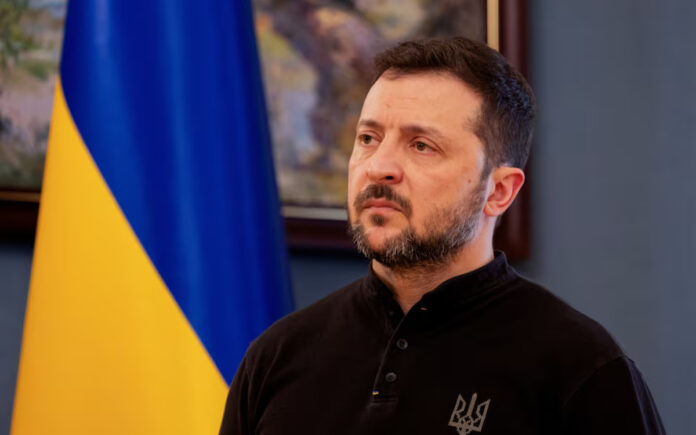Washington/Kyiv: U.S. President Donald Trump on Wednesday criticized Ukrainian President Volodymyr Zelenskiy, calling him “a dictator without elections” and warning that Ukraine risked losing its sovereignty if he did not act swiftly to secure peace.
Trump’s remarks came hours after Zelenskiy rejected his assertion that Ukraine bore responsibility for Russia’s 2022 full-scale invasion. The Ukrainian leader accused Trump of being misled by Russian disinformation.
“A Dictator without Elections, Zelenskiy better move fast or he is not going to have a Country left,” Trump wrote on his Truth Social platform.
In response, Ukrainian Foreign Minister Andrii Sybiha reaffirmed Ukraine’s determination to resist external pressure. “We will defend our right to exist,” Sybiha posted on X.
Ukraine’s Political Landscape Under Martial Law
Zelenskiy’s five-year presidential term was set to end in 2024, but elections have been suspended under martial law, which Ukraine imposed in February 2022 following Russia’s invasion. The conflict has led to Russia seizing approximately 20% of Ukraine’s territory, with ongoing hostilities in the eastern regions.
Moscow claims its “special military operation” was necessary to counter an existential threat posed by Ukraine’s push for NATO membership. However, Kyiv and Western nations dismiss this as a pretext for territorial expansion.
Ukrainian President Volodymyr Zelenskiy hit back at Donald Trump's suggestion that Ukraine was responsible for Russia's 2022 full-scale invasion, saying the US president was trapped in a Russian disinformation bubble https://t.co/yCflY6v8u2 pic.twitter.com/dFI8b8a3MM
— Reuters (@Reuters) February 19, 2025
Zelenskiy met with Trump’s Ukraine envoy, Keith Kellogg, in Kyiv on Wednesday. Following their discussion, Zelenskiy stated that he hoped Trump’s advisors would gain “more truth” about the war. His remarks followed Trump’s claim that Ukraine “should never have started” the conflict with Russia.
Zelenskiy also refuted Trump’s assertion that his domestic approval rating had fallen to just 4%, labeling it as Russian propaganda. “We have evidence that these figures are being discussed between America and Russia. That is, President Trump … unfortunately lives in this disinformation space,” he told Ukrainian television.
A February poll from the Kyiv International Institute of Sociology indicated that 57% of Ukrainians still trust Zelenskiy.
Shifts in U.S. Policy Toward Ukraine
Less than a month into his presidency, Trump has already reversed key aspects of U.S. policy on Ukraine and Russia. His administration has halted efforts to isolate Russia over the invasion, instead engaging in direct dialogue with Moscow. A phone call between Trump and Russian President Vladimir Putin, followed by high-level U.S.-Russia talks, marked a significant departure from Washington’s previous stance.
Trump-Putin Meeting on the Horizon
Trump has indicated that he may meet with Putin later this month. While the Kremlin suggested that such a meeting could take longer to arrange, Russia’s sovereign wealth fund has expressed optimism that some U.S. businesses may return to Russia by the second quarter.
Putin, speaking in Moscow on Wednesday, stated that Ukraine would not be excluded from peace negotiations, but emphasized that any progress would require building trust between Washington and Moscow. He noted that the first round of U.S.-Russia discussions had taken place a day earlier and signaled that a summit with Trump would require careful preparation.
“But we are in such a situation that it is not enough to meet to have tea, coffee, sit and talk about the future,” Putin said in televised remarks. “We need to ensure that our teams prepare issues that are extremely important for both the United States and Russia, including – but not only – on the Ukrainian track, in order to reach solutions acceptable to both sides.”
Ukraine and European leaders were not included in the recent U.S.-Russia talks in Saudi Arabia, fueling concerns that Washington and Moscow could reach a deal that disregards Kyiv’s security interests. Addressing these concerns, Putin said that Ukraine was not being sidelined and that there was no reason for a “hysterical” response.
Europe’s Response and Concerns Over U.S. Policy
Trump has urged European nations to play a larger role in ensuring any potential ceasefire agreement holds. Meanwhile, Zelenskiy has proposed allowing U.S. companies to extract valuable minerals in Ukraine in exchange for security guarantees. However, he noted that Trump has not agreed to such a deal.
During a press conference, Zelenskiy detailed the extent of U.S. support so far, stating that Ukraine has received $67 billion in military aid and $31.5 billion in budgetary assistance. He dismissed American demands for $500 billion worth of Ukrainian minerals as “not a serious conversation” and asserted that he could not “sell his country.”
U.S. envoy Kellogg, upon arriving in Kyiv, acknowledged Ukraine’s security concerns. “We understand the need for security guarantees,” he told reporters, adding that his mission included “sitting and listening.”
Trump’s policy shift on Ukraine has caused unease among European allies. On Wednesday, envoys from the European Union’s 27 member states approved a 16th round of sanctions against Russia, targeting aluminum exports and vessels suspected of transporting sanctioned Russian oil. The EU is also considering increasing military aid to Ukraine, including providing at least 1.5 million rounds of large-caliber artillery ammunition, air defense systems, missiles for deep precision strikes, and drones.
European officials have been caught off guard by the Trump administration’s recent moves on Ukraine. Their primary concern is that they can no longer rely on U.S. military support and that Trump may strike a peace deal with Putin that undermines Kyiv’s position and weakens European security.
Swedish Prime Minister Ulf Kristersson acknowledged internal EU divisions but urged caution. “We need to keep a cool head and continue to support Ukraine,” he stated.



